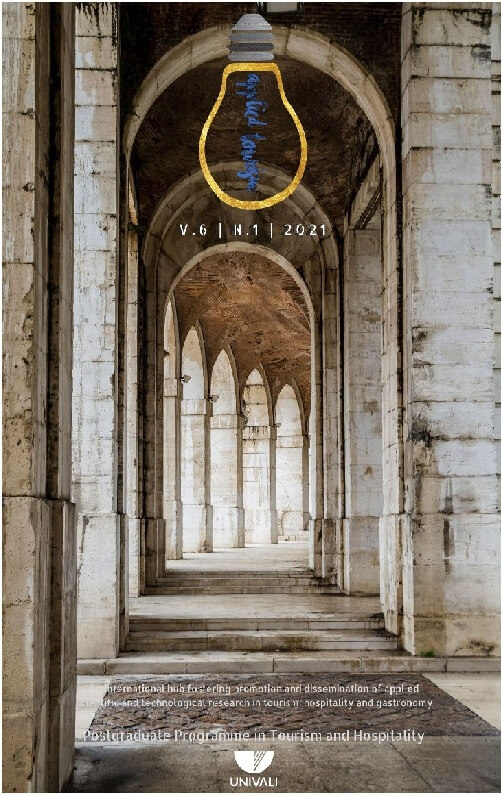

The search for quality in the provision of tourist services is a constant feature among players in the sector. This study aims to analyze the impact of training on the perception of accessibility among participants in a course on how to serve tourists with disabilities. It uses applied, exploratory and descriptive research, with bibliographic analysis and case studies. Two questionnaires were applied to the same group of participants; one before a training course and the other after. The results of the two questionnaires were then compared, using a mixed approach method. The results showed that the training was able to alter the participants' perceptions of accessibility and improve their skills and competencies in serving tourists with disabilities or reduced mobility. As an academic contribution, this research demonstrates the importance of training in the provision of tourist services for people with disabilities or reduced mobility. As a practical contribution, the article provides a resource for market analysts, human resources professionals, government, businessmen and researchers in the area of tourism, for the development of effective training actions to cater for tourists with disabilities or reduced mobility.
Â




Arroyo-López, P. E., Cárcamo-Solís, M. de L., Álvarez-Castañón, L., & Guzmán-López, A. (2016). Impact of training on improving service quality in small provincial restaurants. Journal of Foodservice Business Research, 20(1), 1–14. https://doi.org/10.1080/15378020.2016.1192881
Blichfeldt, B. S., & Nicolaisen, J. (2011). Disabled travel: not easy, but doable. Current Issues in Tourism, 14(1), 79–102. https://doi.org/10.1080/13683500903370159
Brasil. (2015). Lei 13.146, de 6 de julho de 2015. Retrieved April 3, 2019, from http://www.planalto.gov.br/ccivil_03/_Ato2015-2018/2015/Lei/L13146.htm
Brouwers, M. C., Makarski, J., Durocher, L. D., & Levinson, A. J. (2011). E-learning interventions are comparable to user’s manual in a randomized trial of training strategies for the AGREE II. Implementation Science, 6(1), 1–10. https://doi.org/10.1186/1748-5908-6-81
Brown, T. J., Mowen, J. C., Todd Donavan, D., & Licata, J. W. (2002). The customer orientation of service workers: Personality trait effects on self-and supervisor performance ratings. Journal of Marketing Research, 39(1), 110–119. https://doi.org/10.1509/jmkr.39.1.110.18928
Chi, C. G., & Gursoy, D. (2009). Employee satisfaction, customer satisfaction, and financial performance: An empirical examination. International Journal of Hospitality Management, 28(2), 245–253. https://doi.org/10.1016/j.ijhm.2008.08.003
Cooper, D. R., & Schindler, P. (2016). Métodos de pesquisa em administração (10a ed.). Porto Alegre: AMGH.
Creswell, J. W. (2010). Projeto de pesquisa [recurso eletroÌ‚nico]: meÌtodos qualitativo, quantitativo e misto. Tradução Magda Lopes (3a. ed.). Porto Alegre: Artmed.
Creswell, J. W., & Clark, V. L. P. (2013). Pesquisa de meÌtodos mistos [recurso eletroÌ‚nico]: tradução: Magda França Lopes (2a ed.). Porto Alegre: Penso.
Dávid, L., & Kiss, N. (2011). Destination development and management for disabled people. Journal of Tourism Challenges & Trends, 4(2), 113–122.
Davidson, M. C. G., McPhail, R., & Barry, S. (2011). Hospitality HRM: Past, present and the future. International Journal of Contemporary Hospitality Management, 23(4), 498–516. https://doi.org/10.1108/09596111111130001
Degener, T., & Quinn, G. (2018). A survey of international, comparative and regional disability law reform. Retrieved March 27, 2019, from https://dredf.org/news/publications/disability-rights-law-and-policy/a-survey-of-international-comparative-and-regional-disability-law-reform/
Duarte, D. C., & Honorato, T. S. (2020). Turismo cultural acessível: a percepção dos gestores dos principais teatros de Brasília. Turismo - Visão e Ação, 22(3), 575–596. https://doi.org/10.14210/rtva.v22n3.p575-596
Duarte, D. C., & Lemos, G. D. S. (2017). Turismo acessível: estudo da legislação brasileira e internacional sobre os direitos de pessoas com deficiência. Inclusão Social, 10(2), 119–131. https://doi.org/10.22478/ufpb.1981-0695.2018v13n2.43015
Fachin, O. (2017). Fundamentos de metodologia: Noções básicas em pesquisa científica (6a ediçã). São Paulo: Saraiva.
Farrell, M. A., & Oczkowski, E. (2012). Organisational identification and leader member exchange influences on customer orientation and organisational citizenship behaviours. Journal of Strategic Marketing, 20(4), 365–377. https://doi.org/10.1080/0965254X.2011.643917
Fitzimmons, J.; Fitzimmons, M. (2010). Administração de serviços: operações, estratégia e tecnologia de informação. Porto Alegre: Bookman.
Hastorf, S. (1973). Percepção de pessoa. São Paulo: Edgard Blucher.
Hennig-Thurau, T., Gwinner, K. P., Walsh, G., & Gremler, D. D. (2004). Electronic word-of-mouth via consumer-opinion platforms: What motivates consumers to articulate themselves on the Internet? Journal of Interactive Marketing, 18(1), 38–52. https://doi.org/10.1002/dir.10073
Hernández Sampieri, R., Collado, C. F., & Lucio, M. D. P. B. (2015). Metodologia de pesquisa (5a ed.). Porto Alegre: Penso.
Irfan, S. M., Mohsin, M., & Yousaf, I. (2009). Achieving service quality through its valuable human resources : An empirical study of banking sector of Pakistan. World Applied Sciences Journal, 7(10), 1222–1230.
Leite, F. P. A., Ribeiro, L. L. G., & Costa Filho, W. M. da. (2016). Comentários ao Estatuto da Pessoa com Deficiência. (Org., F. P. A. LEITE, L. L. G. RIBEIRO, & W. M. da COSTA FILHO, Eds.). São Paulo: Comentários ao Estatuto da Pessoa com Deficiência.
Lyu, S. O. (2017). Which accessible travel products are people with disabilities willing to pay more? A choice experiment. Tourism Management, 59, 404–412. https://doi.org/10.1016/j.tourman.2016.09.002
Maes, B. (2003). Evaluating quality of support from the perspective of persons with intellectual disabilities: A review. Scandinavian Journal of Disability Research, 5(3), 224–243. https://doi.org/10.1080/15017410309512627
Moller, C. (1992). O lado humano da qualidade: maximizando a qualidade de produtos através de desenvolvimento das pessoas. São Paulo: Pioneira.
Prodanov, C. C., & Freitas, E. C. de. (2013). Metodologia do trabalho científico: métodos e técnicas da pesquisa e do trabalho acadêmico (2a ed.). Novo Hamburgo: Feevale.
Rabontu, C. I. (2018). the Accessibility of Persons With Disabilities in Romanian Tourism. Revista de Turism - Studii Si Cercetari in Turism, 25, 1–6. Retrieved from http://www.revistadeturism.ro/rdt/article/view/401
Richardson, R. J. et al. (1999). Pesquisa social: métodos e técnicas (3a ed.). São Paulo: Atlas.
Robbins, S. P. (2000). Administração: mudanças e perspectivas. São Paulo: Saraiva.
Triviños, A. N. S. (1987). Introdução à pesquisa em ciências sociais: a pesquisa qualitativa em educação. São Paulo: Atlas.
Tutuncu, O. (2017). Investigating the accessibility factors affecting hotel satisfaction of people with physical disabilities. International Journal of Hospitality Management, 65, 29–36. https://doi.org/10.1016/j.ijhm.2017.06.002
World Travel & Tourism Council. (2019). Travel & Tourism Global economic impact & trends 2019




Copyright (c) 2024 Marklea da Cunha Ferst, Helen Rita Menezes Coutinho

Este trabalho está licenciado sob uma licença Creative Commons Attribution-ShareAlike 4.0 International License.






Uma plataforma internacional com a finalidade de promover e disseminar a pesquisa científica e tecnológica aplicada em turismo, hospitalidade e gastronomia.

